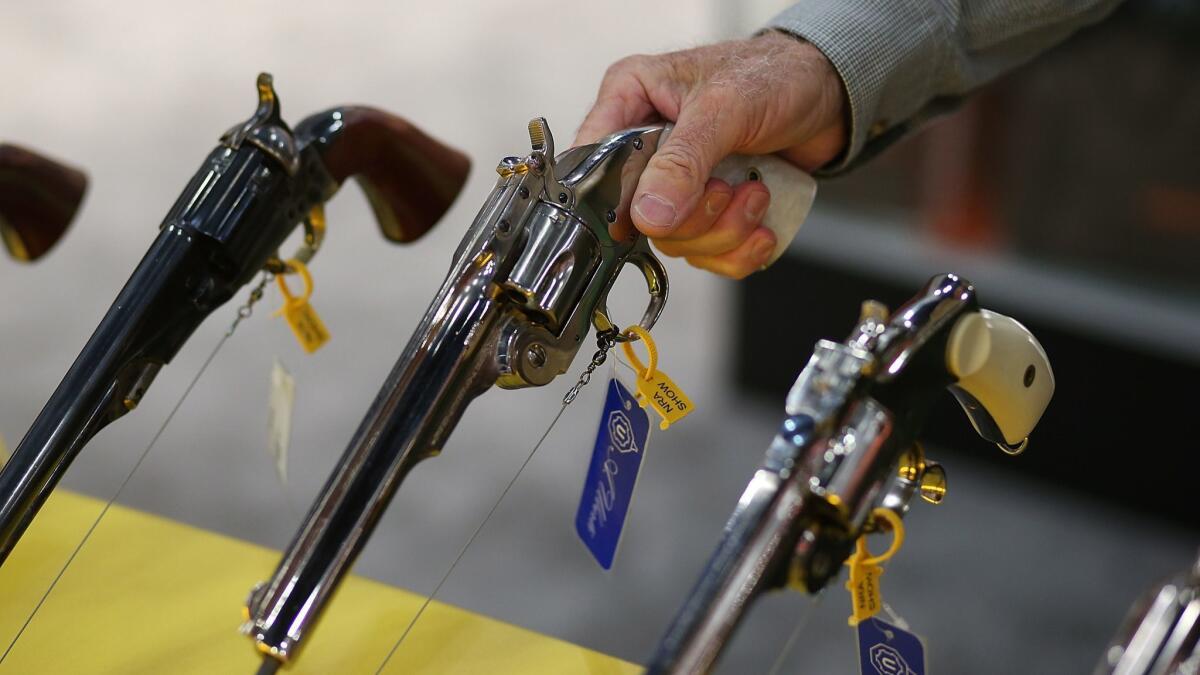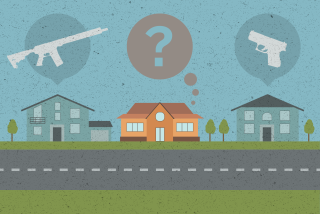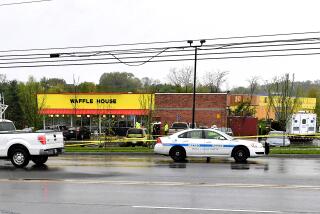As more older Americans struggle with dementia, what happens to their guns?

The man had been a patient for decades, retired now from a career in which firearms were a part of the job. He was enjoying his days hunting, or at the shooting range with friends.
But episodes of confusion had led to a suspicion of dementia, and the nights were the worst: At sundown, he became disoriented, anxious and a little paranoid, and had started sleeping with his loaded pistol under the pillow.
One night, he pointed it at his wife as she returned from the bathroom. It wasn’t clear whether he recognized her, but he was certainly confused — and she was terrified. Thankfully, the incident did not end in disaster.
“I’ve had that patient several times,” said Dr. Michael Victoroff, then a primary care physician in Denver.
What Victoroff knew then is something that has now entered the conversation among primary care physicians across the country: It was high time to have “the talk” with his patient about the safety of his guns when dementia had apparently set in.
“He trusts me implicitly,” said Victoroff, who teaches family medicine at the University of Colorado in addition to being a firearms instructor and competitive shooter.
“You’re the doc,” Victoroff would tell himself. “Somebody’s got to do it.”
As a patient’s memory falters and cognitive skills fade, what is to become of the firearms that have long been a source of pride and a mark of responsible adulthood? Should they be locked up? Disabled? Entrusted to someone else?
These are the questions that a group of physicians challenged their colleagues to discuss with their patients, in an essay published this week in the Annals of Internal Medicine.
Pediatricians and emergency room doctors have been debating for years when and how to counsel their patients about gun ownership and safety — and kicked up political controversy in doing so. But with so many gun-owners reaching and well into their senior years, the essay writers appear confident that few would question a doctor’s motives in raising the safety of gun ownership when a person’s mental competence has come into question.
“No one would challenge you about discussing driving safety with a patient having memory trouble,” said Dr. Donovan Maust, a University of Michigan psychiatry professor who also practices in the Veterans Affairs Ann Arbor Healthcare System. “I don’t think anyone would question your discussing power tools.
“As a physician, my interest is in the safety of my patient and those around him,” added Maust, one of the essay’s authors. “So this feels like it would be negligent not to discuss this with a patient and his or her family.”
To make it easier, the essay authors offered a chart detailing the stages of dementia and the “clinical considerations” that each stage raises. They also proposed a draft “Agreement with my Family” — an advanced directive of sorts for firearms.
And they have made the case that while restrictions on gun ownership may be a political flashpoint, it is a simple matter of safety in the exam room — and therefore a legitimate topic of discussion.
“As with driving, physicians must balance the welfare and privacy interests of individual patients with the health and safety of patients’ families and the public,” the essay authors wrote.
In households where dementia patients have access to firearms, the doctors raised concerns about suicides, accidental shootings, theft and unauthorized use of guns.
The numbers undergirding those concerns are striking.
Roughly 1 in 3 adults over 65 in the United States is thought to own a gun. An additional 12% live in a household with someone who does.
As seniors turn 70, their odds of developing Alzheimer’s disease in a given year jump from less than 1% (among those 65 to 69) to 2.5% (among those 70 to 74), and keep rising from there. By 2050, the number of older Americans with Alzheimer’s is expected to reach 13.8 million.
The new effort may build on an earlier program that has united physicians, public health experts and gun owner groups.
Close to two-thirds of the U.S.’ roughly 34,000 shooting fatalities yearly are suicides. Starting in 2009, the Gun Shop Project brought together these unlikely allies to reduce the number of suicides carried out with a gun. The project has devised printed materials that firearms businesses can distribute to customers. As it has proliferated across 21 states, some participants have created programs aimed at helping gun retailers recognize people who may be suicidal.
Veterans of the Gun Shop Project see the focus on dementia and guns as a natural next step.
“It wouldn’t be a big leap, and I would think the timing would be relatively similar” to a physician’s focus on a patient’s driving safety, said Jacquelyn Clark, who has owned Bristlecone Shooting, Training & Retail Center on the outskirts of Denver since 2015. Like a car, “a gun is a tool — you need to be operating safely and to be of sound mind to be using it.”
Clark said that while she has seen instances of forgetfulness on the part of longtime customers, it was her gunsmith who first came to her with concerns about dementia and firearms safety. Having watched a family member slide into dementia, he asked himself what he would want done with his guns if he could no longer use them safely.
“There’s really no support system out there that tackles this,” Clark said.
Whether focusing on suicide or dementia, “I think we’re barking up the same tree,” added Ralph Demicco, who owned a chain of New Hampshire gun stores, Riley’s Sport Shops, for close to 30 years. “To encourage family members to take preventive measures makes sense. Unlike a lot of signs of suicide, an individual sliding toward dementia would seem to have a very pronounced and noticeable progression. So there’s ample time for family members to intercede.”
No federal laws prohibit the purchase or possession of firearms by a person with dementia. Only two states, Hawaii and Texas, explicitly mention dementia or similar conditions in their firearms statutes.
In Hawaii, any person under treatment for “organic brain syndromes” is prohibited from owning a gun. Texas law makes individuals diagnosed with “chronic dementia” ineligible for a license to carry a handgun in public. But it does not limit such a person’s right to purchase or possess firearms.
Those who have been active in anti-suicide initiatives say it’s for families to figure out when dementia dictates the time has come for the guns to go, or at least be locked up. Doctors can play a key role in bringing those concerns to a patient’s family, they said. And they should not wait until dementia is evident.
“Many questions surrounding firearm access in dementia remain unanswered, but the need to address the problem is here now,” the essay authors wrote. “We believe a concerted, cooperative effort making the best use of the data at hand can help prevent injuries and deaths while protecting the dignity and rights of older adults.”
“It’s not about us vs. them, or taking away people’s guns. It’s about us helping people make choices in the interest of safety,” said Dr. Emmy Betz, an emergency physician at the University of Colorado at Denver and lead author of the essay.
“It would be awesome if all our older patients would think ahead about where and when and how they would hang up their keys and or safeguard their guns,” Betz said. “Most of us don’t do that because we’re human. But we can try.”
MORE IN SCIENCE
Fatal falls are on the rise for America’s senior citizens
This room was off-limits to smokers, but its air contained surprising amounts of ‘thirdhand smoke’
Scientists make a maze-running artificial intelligence program that learns to take shortcuts







